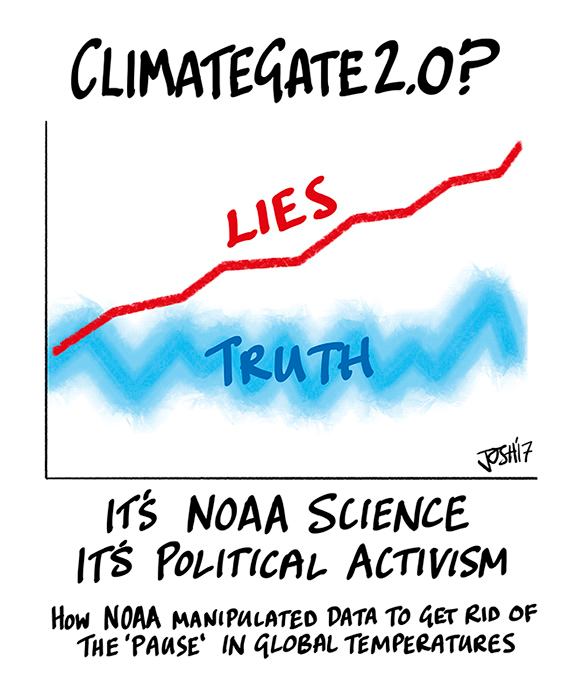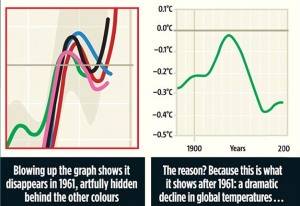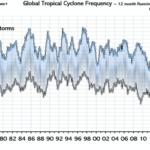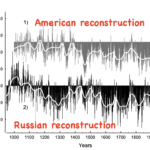
Onlangs verwees Jeroen Hetzler naar een artikel in de ‘Daily Mail’ van David Rose, getiteld, ‘Exposed: How world leaders were duped into investing billions over manipulated global warming data‘. Volgens Rose was de datamanipulatie die had plaatsgevonden bij NOAA vergelijkbaar met het Climategate-schandaal. Na de door NOAA toegepaste aanpassing van de temperatuurdata was de algemeen (ook door het IPCC) erkende opwarmings’pauze’ of hiatus verdwenen.
Verschillende respondenten attendeerden ons op hetzelfde artikel. Ook Judith Curry heeft er over geschreven: een lang en voor de geïnteresseerde leek moeilijk toegankelijk technisch verhaal, waarvan de toonzetting voorzichtiger was dan die van de meer sensationele versie van David Rose.
Daarnaast heeft ook Matt Ridley in ‘The Times’ commentaar geleverd – leesbaarder dan dat van Judith Curry. Hij plaatste het voorval daarbij in de bredere context van de talloze incidenten, waarop de klimatologische wetenschap het patent lijkt te hebben
De titel van zijn artikel luidde: ‘Climate change: Politics and science are a toxic combination’. Ik pik er een aantal krenten uit.
Back in December, some American scientists began copying government climate data onto independent servers in what press reports described as an attempt to safeguard it from political interference by the Trump administration. There is to be a March for Science in April whose organisers say: “It is time for people who support scientific research and evidence-based policies to take a public stand and be counted.”
Well, today they have a chance to do just that, but against their own colleagues who stand accused of doing what they claim the Trump team has done. Devastating new testimony from John Bates, a whistleblowing senior scientist at America’s main climate agency, the National Oceanic and Atmospheric Administration, alleges that scientists themselves have been indulging in alternative facts, fake news and policy-based evidence.
Bates’s essay on the Climate Etc. website (and David Rose’s story in The Mail on Sunday) documents allegations of scientific misconduct as serious as that of the anti-vaccine campaign of Andrew Wakefield. Bates’s boss, Tom Karl, a close ally of former US president Barack Obama’s science adviser, John Holdren, published a paper in 2015, deliberately timed to influence the Paris climate jamboree. The paper was widely hailed in the media as disproving the politically inconvenient 18-year pause in global warming, whose existence had been conceded by the Intergovernmental Panel on Climate Change two years earlier.
Bates says Karl based the “pausebuster” paper on a flawed land-surface data set that had not been verified or properly archived; and on a sea-surface set that corrected reliable data from buoys with unreliable data from ship intakes, which resulted in a slightly enhanced warming trend. Science magazine is considering retracting the paper. A key congressional committee says the allegations confirm some of its suspicions. …
This is more than just a routine scientific scandal. First, it comes as scientists have been accusing US President Donald Trump and other politicians of politicising science. Second, it potentially contaminates any claim that climate science has been producing unbiased results. Third, it embarrasses science journalists who have been chronicling the growing evidence of scientific misconduct in medicine, toxicology and psychology, but ignored the same about climate science because they approve of the cause, a habit known as noble-cause corruption. …
 Besides, this is just the latest scandal to rock climate science. The biggest was climategate in 2009, which showed scientists conspiring to ostracise sceptics, delete emails, game peer review and manipulate the presentation of data, including the truncation of a tree-ring-derived graph to disguise the fact that it seemed to show recent cooling (“hide the decline”).
Besides, this is just the latest scandal to rock climate science. The biggest was climategate in 2009, which showed scientists conspiring to ostracise sceptics, delete emails, game peer review and manipulate the presentation of data, including the truncation of a tree-ring-derived graph to disguise the fact that it seemed to show recent cooling (“hide the decline”).
The scientists concerned were criticised by two rather perfunctory inquiries, but have since taken to saying they were “exonerated”.
There was the case of the paper the IPCC relied upon to show that local urban warming was not distorting global data sets, which turned out to be based partly on non-existent data from 49 Chinese weather stations; the Scandinavian lake sediment core used “upside down” to imply sudden warming; the chart showing unprecedented recent warming that turned out to depend on a single larch tree in Siberia; the southern hemisphere hockey-stick chart that had been created by the omission of inconvenient data series; the Antarctic temperature trend that turned out to depend on splicing together two weather station records.
Then there was the time when a well known climate scientist, Peter Gleick, stole the identity of a member of a think tank so he could leak confidential documents along with a fake one. Stephan Lewandowsky had to retract a paper about the psychology of climate scepticism that seemed to be full of methodological flaws and bizarre reasoning.
And don’t forget Rajendra Pachauri, chairman of the IPCC for 13 years and often described as the “world’s top climate scientist”. He had to retract his “voodoo science” dismissal of a valid finding that contradicted claims from Pachauri’s own research institute about Himalayan glaciers, which had led to a lucrative grant. That scandal resulted in a highly critical report into the IPCC by several of the world’s top science academies, which recommended among other things that the IPCC chairman stand down after one term. Pachauri ignored this, kept his job and toured the world while urging others not to, before resigning over a personal scandal allegation. …
Ridley besluit zijn artikel met een oproep aan wetenschappers om zich te verzetten tegen de politisering van de wetenschap.
Lees verder hier.
Voor mijn eerdere bijdragen over klimaat en aanverwante zaken zie hier, hier, hier, hier en hier.






Science blijkt geen enkele intentie te hebben om hier ook maar iets mee te doen.
Terwijl afgelopen najaar de nieuwe ‘editor-in-chief’ nog meldde dat zijn motivatie voor die baan mede te maken had met het verlies aan vertrouwen in de wetenschap.
Klinkt als een nieuwjaarsresolutie.
Omdat er niets mis is met de studie en ook niet met de data of het archiveren van de data
Als het werk van Karl er al. niet goed zou zijn dan zal een andere wetenschapper op een andere manier de fouten er wel uithalen. Echter het werk van Karl er al is net bevestigd door Zeke Hausfater (die ook aan BEST ) heft mee gewerkt.
De pauze is over en dat is natuurlijk lastig accepteren voor mensen die de afgelopen 5 jaar daar hun mening op hebben gebaseerd
If the facts change I change my opinion, what do you do sir ?
Henk’s dagelijkse nep-commentaar!
En de eeuwige weigering van de “sceptici ” om hun mening wetenschappelijk te onderbouwen
De CAGW mist elek wetenschappelijke onderbouwing, Henk. Probeer het eens zelf, maak je zelf nog eens belachelijk!!
Waarom ik niet in al die klimaat hysterie geloof :
Er is nog niet eens een goede weersverwachting voor
de komende 2 weken.
Dan is een verwachting 10 jaar vooruit absoluut
Potty!!!
Nog mooier was het bericht van de president van de AGU, de Amerikaanse beroepsorganisatie voor geofysici, die zich ook achter de studie schaarde.
Terwijl de AGU helemaal niets met Karl et al. [2015] te maken heeft: die stond in Science.
Als Ridley nu eens een oproep zou doen voor het stoppen met het publiceren in blogjes en zou dien wat al jaren goed werkt in de wetenschap nl. Onderzoek doen en publiceren in de wetenschappelijke literatuur dan zou ik hem nog steunen ook, maar Ridley is natuurlijk gewoon lid van de politiek ingestelde GWPF en schrijft liever blogjes dan onderzoek te doen en doet dus het hardste mee aan het politiseren van het klimaat debat ( en niet Karl die gewoon onderzoek doet en publiceert zo dat iedereen zijn methode en data kan gebruiken)
Jammer Hans dat je ook niet even aandacht geeft aan de inhoudelijke kritiek die overal makkelijk te vinden in over de sensatie verhalen in de daily fail en de echte kritiek van Tom Baten ( nl het niet voldoende volgen van het door hem ontworpen filing systeem wat echter geen invloed heeft op de resultaten )?
Zoals Richard Tol twitterde:
Climate activists are pathologically unable to admit wrongdoing
Daar hebben “sceptici” inderdaad wel last van
Grafiekjes kunnen duidelijker / beter! Met meer legenda en argumentatie. Nu onduidelijk.
Scheffer,
Zie:
https://wattsupwiththat.com/2011/11/30/hide-the-decline-worse-than-we-thought/
Thanks Hans, duidelijker: Mann et al (EOS 2003) Figure 1 lijkt op een vroege Mondriaan :-)
Dit is het zoveelste incident in een lange reeks, Het betreft niet alleen dit terrein maar ook de censuur en eenzijdigheid bij de media, vrijwel allemaal met beperkte uitzondering, links elitair , het links elitaire onderwijs op scholen, het opdringen van een links elitaire partijkeuze via demonisering et cetera. Het lijkt mij onwaarschijnlijk dat dit schandaal door het NOS-journaal zal worden gemeld. Maar ik blijf een optimist tot in de kist. Het is allemaal tekenend voor het establishment.
Jeroen,
Er is geen schandaal of misschien wel ……
Het is een schandaal dat mensen deze onzin blijven geloven
In de Elsevier van 21 januari staat nog een artikel over de klimaathysterie.
Het gaat de burger flink geld kosten in ons kleine Nederland.
Neem de moeite het te lezen.
Twee klokkenluiders in twee dagen: NOAA en UN:
“Bates zegt nu dat die conclusie het gevolg is van manipulatie. De top van NOAA zou ‘de vinger op de weegschaal hebben gehad’ tot de juiste getallen uit het onderzoek kwamen. Cijfers die niet pasten binnen de visie van de organisatie werden weggelaten, gegevens die het beeld van voortgaande opwarming bevestigen, werden aangedikt, schrijft Bates op het blog Climate Etc, van Judith Curry, voormalig klimaatonderzoeker en medescepticus.”
http://www.faqt.nl/recent/klokkenluider-ontkent-aardopwarming/
“After much speculation and debate over the falsities and realities of so-called “climate change,” the truth has finally made its way to light. United Nations (U.N.) official Christina Figueres recently made a stunning statement at a Brussels news conference, admitting that global warming is a hoax. Figueres, the executive secretary of the U.N.’s Framework Convention on Climate Change, carefully worded her admission. The takeaway is that climate activists aren’t actually trying to save the planet, they’re trying to kill capitalism.
Figueres initially stated: “This is the first time in the history of mankind that we are setting ourselves the task of intentionally, within a defined period of time, to change the economic development model that has been reigning for at least 150 years, since the Industrial Revolution.” Figueres reiterates, “This is probably the most difficult task we have ever given ourselves, which is to intentionally transform the economic development model for the first time in human history.”
http://www.naturalnews.com/2017-02-06-un-official-claims-global-warming-hoax-is-all-about-eliminating-capitalism-suppressing-the-economy.html
Overigens sneeuwt het momenteel in Dubai.
https://www.armstrongeconomics.com/world-news/climate/snowing-in-sahara/
http://www.telegraaf.nl/digitaal/27591011/__Wikipedia_schrapt_Daily_Mail_als_bron__.html
En nou niet gelijk roepen dat Wikipedia niet deugt…